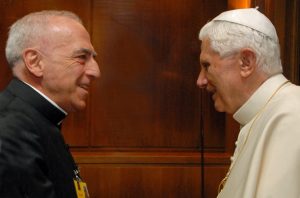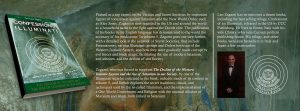
Msgr. Nicola Bux and Pope Benedict XVI
Article by DEBRA HEINE
In an important interview that was overlooked last month, a Vatican theologian said that unless Pope Francis corrects himself and reaffirms Church teaching on morals, the faith, and the sacraments, “the apostasy will deepen and the de facto schism will widen.”
To address the current crisis, he suggested that an examination of the “juridical validity” of Pope Benedict’s XVI’s resignation was in order to “overcome problems that today seem insurmountable to us.” The theologian consultor to the Congregation for the Causes of Saints was implying that further study of the situation could reveal that Francis is not and has never been a valid pope, but is, in fact, an antipope who could be removed from the papacy, thus nullifying his “insurmountable” errors.
Msgr. Nicola Bux, a former consultor to the Congregation for the Doctrine of the Faith under Benedict XVI, made the remarkable comments in an in-depth interview with Vatican reporter Aldo Maria Valli, the same reporter who interviewed Archbishop Carlo Viganò before he accused the pope of covering up clerical sexual misconduct in a stunning eleven-page letter back in August.
Writing on his own blog, National Catholic Register reporter Edward Pentin says that Bux warned that the current pope is issuing statements that are generating “heresies, schisms, and controversies of various kinds” and that the pontiff should issue a profession of faith to restore unity in the Church.
In the interview, published Oct. 13 but overlooked due to the Youth Synod taking place in Rome last month, the theologian consultor to the Congregation for the Causes of Saints said “heretical statements” on marriage, the moral life and reception of the sacraments are now “at the center of a vast debate which is becoming more and more passionate by the day.”
Msgr. Bux said the origin of many of these questioned teachings — highlighted in a September 2017 filial correction and at a Rome conference in April on doctrinal confusion in the Church — is the Pope’s post-synodal apostolic exhortation Amoris Laetitia, but they have since become “considerably worse and more complicated.”
He said this has led some senior prelates, such as Cardinal Walter Brandmüller, one of the four cardinals to sign the dubia in 2016, to reiterate a call for a “profession of faith on the part of the Pope.”
But Msgr. Bux said this would be difficult to achieve given the Pope’s vision of the Church as a federation of ecclesial communities — something Msgr. Bux described as “a bit like the Protestant communities.”
The theologian said that after the last two synods on the family, teaching on faith and morality has become inconsistent on the question of whether to give Holy Communion to divorced and remarried Catholics.
“Not a few bishops and parish priests, therefore, are in great embarrassment, because of an unstable and confused pastoral situation,” he said.
Msgr. Bux said some kind of profession of faith — like the one St. Paul VI made in 1968 reaffirming what is Catholic “in the face of the errors and heresies” that came immediately after the Second Vatican Council — is required of the pope to remedy the situation.
“If this doesn’t happen,” he warned, “the apostasy will deepen and the de facto schism will widen.”
Msgr. Bux said the situation had “become even more urgent as a result of the latest changes introduced by the pope, such as that concerning the definition of ‘anti-evangelism’ of the death penalty.”
“And the problems, I said, are notable, because either we admit that the Church has taught the legitimacy of something anti-evangelical practically for two thousand years or we must admit that it was Pope Bergoglio to err, considering anti-evangelical what, at contrary, it is at least abstractly compliant with Revelation,” Bux said. “This is a very sensitive issue, but sooner or later he’s going have to put this right. And not just for the death penalty.”
Asked by Valli if this sets a precedent for the Pope to change more of the Catechism if he wishes, the theologian said this is a “very disturbing question,” and that another “legitimate concern” is to keep the deposit of faith from “sensitivities contingent on today’s or tomorrow’s society.”
The Pope cannot “impose his own opinion” on the Church, Msgr. Bux stressed, quoting Joseph Ratzinger, because on matters of faith, morals and the sacraments, the Church can “only consent to the will of Christ.” And yet he said “many points” in Amoris Laetitia are “cumbersome and contradictory” as well as contrary to the thinking of St. Thomas Aquinas, despite the exhortation asserting otherwise.
Msgr. Bux also addressed the pope’s tendency to be silent in the face of criticism, and refusal to engage the charges of heresy or apostasy by pointing out St. Pius X’s warning in his 1907 encyclical Pascendi Dominici Gregis: That never “clearly confessing one’s own heresy” is “typical behaviour of the modernists, because in this way they can hide themselves within the Church.”
The monsignor went on to suggest that if found guilty of heresy, Pope Francis could be removed from office.
“In the Decree of Gratian (pars I, paragraph 40, chapter VI) there is this canon: ‘No mortal will presume to speak of the pope’s guilt, since, appointed to judge everyone, he must not be judged by anyone unless you deviate from faith,'” he said.
Msgr. Bux explained that “the distancing and deviation from the faith is called heresy” and “in the case of manifest heresy, according to St. Robert Bellarmine, the pope can be judged.”
He added that “the pope is called by the Lord to spread the Catholic faith, but to do so he must prove capable of defending it.”
Valli asked the monsignor if he was saying a pope found to be heretical would “cease to be the pope and head of the ecclesial body, and he loses all jurisdiction.”
“Yes, heresy affects the faith and the status of a member of the Church, which are the root and foundation of jurisdiction,” Msgr. Bux replied. “Every faithful, including the Pope, with heresy separates himself from the unity of the Church. It is well known that the Pope is at the same time a member and part of the Church, because the hierarchy is within and not above the Church, as stated in Lumen gentium (No. 18).”
Msgr. Bux noted however that it is difficult “identifying the exact contours of a heresy” because theology “is no longer reliable,” but has become a “sort of arena” where “everything converges and its opposite.”
“So, affirmed a truth, there will always be someone willing to defend the exact opposite. As you can see, there are many practical, theological and juridical difficulties to the question of the judgment of the heretical pope,” the theologian lamented.
He suggested that from a practical point of view, “it would be easier to examine and study more accurately the question concerning the juridical validity of Pope Benedict XVI’s renunciation,” for example, examining whether it was “full or partial (‘halfway’).” Msgr. Bux added that “the idea of a sort of collegiate papacy seems to me decidedly against the Gospel dictate.”
Msgr. Bux pointed out that Jesus did not, in fact, tibi dabo claves [give the keys of heaven] to Peter and Andrew, but only to Peter!
“That’s why I say that perhaps a thorough study of renunciation could be more useful and profitable, as well as helping to overcome problems that today seem insurmountable to us,” the theologian declared.
He quoted Saverio Gaeta, Fatima, the whole truth, saying: “It was written: ‘There will also come a time of the most difficult trials for the Church. Cardinals will oppose cardinals and bishops to bishops. Satan will put himself in their midst. Also in Rome there will be great changes.'”
Msgr. Bux argued that with Pope Francis, “great change” in the church is “palpable,” along with a clear intention to “break with the previous pontificates.”
“This discontinuity — a revolution — generates heresies, schisms and controversies of various kinds. However, all of them can be traced back to sin,” he said. Quoting 3rd century Church Father Origen of Alexandria, he added: “Where there is sin, there we find multiplicity, there schisms, there heresies, there the controversies. Where virtue reigns, there is unity, there is communion, thanks to which all believers were one heart and one soul.”
As an encouragement to faithful Catholics, Msgr. Bux quoted St. Athanasius of Alexandria’s address to Christians who suffered under the Arians:
You remain outside the places of worship, but faith dwells in you. Let’s see: what is more important, the place or the faith? True faith, of course. Who has lost and who has won in this fight, the one keeps the See or observes the faith? It is true, the buildings are good, when the apostolic faith is preached to you; they are holy if everything happens there in a holy way… You are the ones who are happy, you who remain within the Church because of your faith, who keep its foundations strong as they have been passed down to you through the apostolic tradition. And if some execrable jealousy tries to shake it on various occasions, it does not succeed. They are the ones who broke away from it in the current crisis. No one, never, will prevail against your faith, beloved brothers, and we believe that God will make us one day return our churches. The more violent they try to occupy the places of worship, the more they separate themselves from the Church. They claim that they represent the Church, but in reality they are the ones who are, in turn, expelled from it and go off the road.
Valli asked Bux whether heresy is not just about spreading false doctrines but also “silencing the truth about doctrine and morals.”
“Of course it is,” he responded. “Where there is no doctrine, there are moral problems — as we are seeing. When the pope and bishops do this, they use their office to destroy [doctrine].”
Quoting St. Augustine, he said, “they seek their own interests, not the interests of Jesus Christ; they proclaim his word, but spread their ideas.”
Quoting Cardinal Giacomo Biffi of Bologna, he added: “The name of Jesus Christ has become an excuse to talk about something else: migration, ecology and so on. Thus we are no longer unanimous in speaking (1 Cor 1: 10) and the Church is divided.”

Article suggested by Leo Zagami a regular contributor to Infowars and the author of the new book Confessions of an Illuminati Volume 5: The Decline of the West and the Rise of Satanism in our Society
OUT NOW ON KINDLE: https://www.amazon.com/dp/B07BQVQ9ZM/ref=tsm_1_fb_lk
And on paperback : https://www.amazon.com/dp/1986894657/ref=sr_1_8?ie=UTF8&qid=1522233257&sr=8-8&keywords=leo+zagami